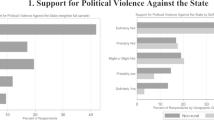Abstract
The latest survey – in a series extending from 1991 to 2008 – shows for the first time that the US trade embargo no longer enjoys majority support among South Florida's Cuban Americans. This erosion of support may not be entirely a result of the failure of the embargo to accomplish its proclaimed goal. Nearly 50 years of economic sanctions against Cuba have not precipitated the Castro regime's compliance or collapse. Yet, majority support for the embargo was sustained across all Cuban American immigration cohorts and generations in a 2004 survey (N=1807). Significantly, the same survey shows that specific components of a full embargo – banning or restricting food, medicine and travel – obtained no more than minority support in any cohort arriving after 1981. This apparent discrepancy suggests that the embargo – embedded in an “exile ideology” – had become a more palatable, over-arching anti-Castro symbol than have specific anti-Castro sanctions. Logistic Regression results show that with respect to anti-Castro measures, sanctions incurring tangible costs generate the greatest disagreement among South Florida's Cuban Americans. Ultimately, in December 2008, even a largely symbolic expression of the exile ideology, Republican registration, was no longer embraced by a majority of Cuban Americans who had either recently immigrated or were born outside Cuba.

Similar content being viewed by others
References
Barreto, M., R. de la Garza, J. Lee, J. Ryu and H.P. Pachon . 2002. A Glimpse into Latino Policy and Voting Preferences. The Tomas Rivera Policy Institute, March, http://www.trpi.org/update/socialpolitical.html.
Davis, S.P . 1991. Economic Pressure on South Africa: Does It Work? In Effective Sanctions on South Africa: The Cutting Edge of Intervention, ed. G.W. Shepherd Jr, 65–96. New York: Greenwood Press.
De los Angeles Torres, M . 1999. In the Land of Mirrors: Cuban Exile Politics in the United States. Ann Arbor, MI: The University of Michigan.
De Varona, A.L . 1994. Propaganda and Reality: A Look at the US. Embargo Against Castro's Cuba. Miami, FL: Cuban American National Foundation.
Dominguez, J.I . 1989. The Obstacles and Prospects for Improved U.S.-Cuban Relations: A U.S. Perspective. In U.S.-Cuban Relations in the 1990s, eds. J.I. Dominguez and R. Hernandez, 15–38. Boulder, CO: Westview Press.
Doxey, M.P . 1987. International Sanctions in Contemporary Perspective. New York: St. Martin's.
García, M.C . 1996. Havana USA: Cuban Exiles and Cuban Americans in South Florida, 1959–1994. Berkeley, CA: University of California Press.
Girard, C. and G.J. Grenier . 2008. Insulating an Ideology: The Enclave Effect on South Florida's Cuban Americans. Hispanic Journal of Behavioral Sciences 30: 530–543.
Gonzalez-Pando, M . 1998. The Cuban Americans. Westport, CN: Greenwood.
Grenier, G.J . 2006. The Creation and Maintenance of the Cuban American “Exile Ideology”: Evidence from the FIU Cuba Poll 2004. Journal of American Ethnic History 25: 209–224.
IPOR. 2004. Institute for Public Opinion Research. Florida International University, http://www.fiu.edu/orgs/ipor/cubapoll/index.html.
IPOR. 2007. Institute for Public Opinion Research. Florida International University, http://www.fiu.edu/~ipor/cuba8/CubaComp.htm.
IPOR. 2008. Institute for Public Opinion Research. Florida International University, http://www.fiu.edu/~ipor/cuba-t/.
Kaempfer, W.H. and A.D. Lowenberg . 1988. The Theory of International Economic Sanctions: A Public Choice Approach. The American Economic Review 78: 786–793.
Kaplowitz, D.R . 1998. Anatomy of a Failed Embargo: U.S. Sanctions against Cuba. Boulder, CO: Lynne Rienner Publishers.
Lisio, S.A . 1996. Helms-Burton and the Point of Diminishing Returns. International Affairs 72: 691–711.
López, J.J . 1998. Implications of the U.S. Economic Embargo for a Political Transition in Cuba. Cuban Studies 28: 40–69.
Moreno, D . 1997. The Cuban Model: Political Empowerment in Miami. In Pursuing Power: Latinos and the Political System, ed. F.C. Garcia, 208–226. Notre Dame, IN: University of Notre Dame Press.
Moreno, D. and C.L. Warren . 1992. The Conservative Enclave: Cubans in Florida. In From Rhetoric to Reality: Latino Politics in the 1988 Election, eds. R.O. de la Garza and L. Desipio, 127–145. Boulder, CO: Westview Press.
Navarro, S.A . 2004. Interest Groups and Social Movement. In Latino Americans and Political Participation: A Reference Handbook, eds. S.A. Navarro and A.X. Mejia, 89–120. Santa Barbara, CA: ABC-CLIO.
Nossal, K.R . 1989. International Sanctions as International Punishment. International Organization 43: 301–322.
Pedraza, S . 2007. Political Disaffection in Cuba's Revolution and Exodus. Cambridge: Cambridge University Press.
Pérez, L . 1992. Cuban Miami. In Miami Now!: Immigration, Ethnicity, and Social Change, eds. G.J. Grenier and A. Stepick III, 83–108. Gainesville, FL: University Press of Florida.
Rodriguez, D . 2002. Latino National Political Coalitions: Struggles and Challenges. New York: Routledge.
Roy, J . 1997. The Helms-Burton Law: Development, Consequences, and Legacy for Inter-American and European-U.S. Relations. Journal of Interamerican Studies and World Affiars 39: 77–108.
Schwartzman, K.C . 2001. Can International Boycotts Transform Political Systems? The Cases of Cuba and South Africa. Latin American Politics and Society 43: 115–146.
Schoultz, L . 2002. Blessings of Liberty: The United States and the Promotion of Democracy in Cuba. Journal of Latin American Studies 34: 397–425.
Smith, W.S . 1998. Our Dysfunctional Cuban Embargo. Orbis 42: 533–544.
Skop, E.H . 2001. Race and Place in the Adaptation of Mariel Exiles. International Migration Review 35: 449–471.
Spadoni, P . 2006. The US Congress and the Cuban Embargo: Analysis of a Learning Process. In Organizational Learning in the Global Context, eds. M.L. Brown, M. Kenney and M. Zarkin, 41–68. Aldershot, UK; Burlington, VT: Ashgate Publishing.
US House of Representatives, Committee on Ways and Means, Subcommittee on Trade. 1995. The Economic Relationship between The United States and Cuba, S104–23, 30 June Washington DC: U.S. Government Printing Office.
Weintraub, S . 1982. Current Theory. In Economic Coercion and U.S. Foreign Policy: Implications of Case Studies from the Johnson Administration, ed. S. Weintraub, 7–28. Boulder, CO: Westview Press.
Author information
Authors and Affiliations
Rights and permissions
About this article
Cite this article
Girard, C., Grenier, G. & Gladwin, H. The declining symbolic significance of the embargo for South Florida's Cuban Americans. Lat Stud 8, 4–22 (2010). https://doi.org/10.1057/lst.2010.1
Published:
Issue Date:
DOI: https://doi.org/10.1057/lst.2010.1




